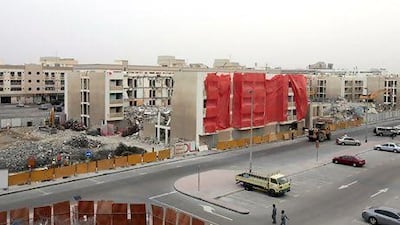DUBAI// The once bustling Sheikh Rashid Colony is slowly being reduced to rubble as work continues on demolishing Dubai's original low-income housing complex.
Only a skeletal outline remains of the buildings in Karama that were home mostly to South Asian expatriates. Most of the 17 blocks have been pulled down by bulldozers and teams of about 30 men, working 10 hours a day.
"We began demolishing in mid January," said KS Arora, director of Goldline Building Demolition, the company commissioned to raze eight blocks.
"We have brought down four buildings. Work on two is going on and two others remain. It will take another month to finish."
Dubai Municipality ordered the housing complex to be pulled down after it was ruled "unsafe for residents and pedestrians" and the homes deemed beyond repair.
New flats are to be built in its place. Developer Wasl Properties did not reveal its plans for the area.
Sheikh Rashid Colony was built in 1978 on the orders of Sheikh Rashid bin Saeed, the emirate's ruler at the time, to provide low-cost housing for low-income families. Similar developments sharing the same name were later built in Al Qusais and Satwa. The Satwa complex was demolished more than 10 years ago.
In Al Qusais, the flats were renovated in 2009 and rents were increased after initial eviction notices were withdrawn.
However, it was not entirely immune to changes in the market, and several years ago rents were increased to Dh10,000 for existing tenants and Dh35,000 for new tenants.
Hundreds of residents at the 880 units were given notice to leave by last June, although many stayed on at the 34-year-old complex until August.
Despite moving away from their old homes more than seven months ago, many former tenants still have fond memories.
"I miss living there," said Vineesh Vasu, who grew up in the Sheikh Rashid Colony but now lives in Satwa with his wife and extended family.
"There is a lot of nostalgia attached to the place. Most of all, I miss the community. We knew our neighbours and could always open the door and shout for help if we needed anything."
Mr Vasu recalled how the neighbourhood changed over the years. "I have watched Karama grow from a small family hub to a big crowded place. Parking lots have come up in areas where we used to play football."
Today, bright orange and blue plastic sheets adorn the exterior of what remains of the three-storey buildings in anticipation of the wrecking ball. Mr Arora said the sheets were used to prevent dust from the site blowing around the neighbourhood.
"We have to protect the sand from getting out while working. There were challenges of working in a residential area.
"We have time limits for trucks to enter. We cannot work on Fridays and have to take care of noise levels. Sometimes aged people or students writing exams complain and ask us to stop working. We try to do it but we have to finish on time. The weather is dusty too."
Steel pipes salvaged from the buildings are sifted and sold, while concrete waste is taken to the Dubai Municipality dump.
Businesses in the area say trade has suffered since the complex was shut. "We have lost 50 per cent of our customers," said Mohammed Jehangir, who works at the nearby Seven Days supermarket.
"There is a difference in business since the colony was vacated," said Nasser, who works in the Mak's Corner cafeteria in the neighbourhood.
pkannan@thenational.ae

